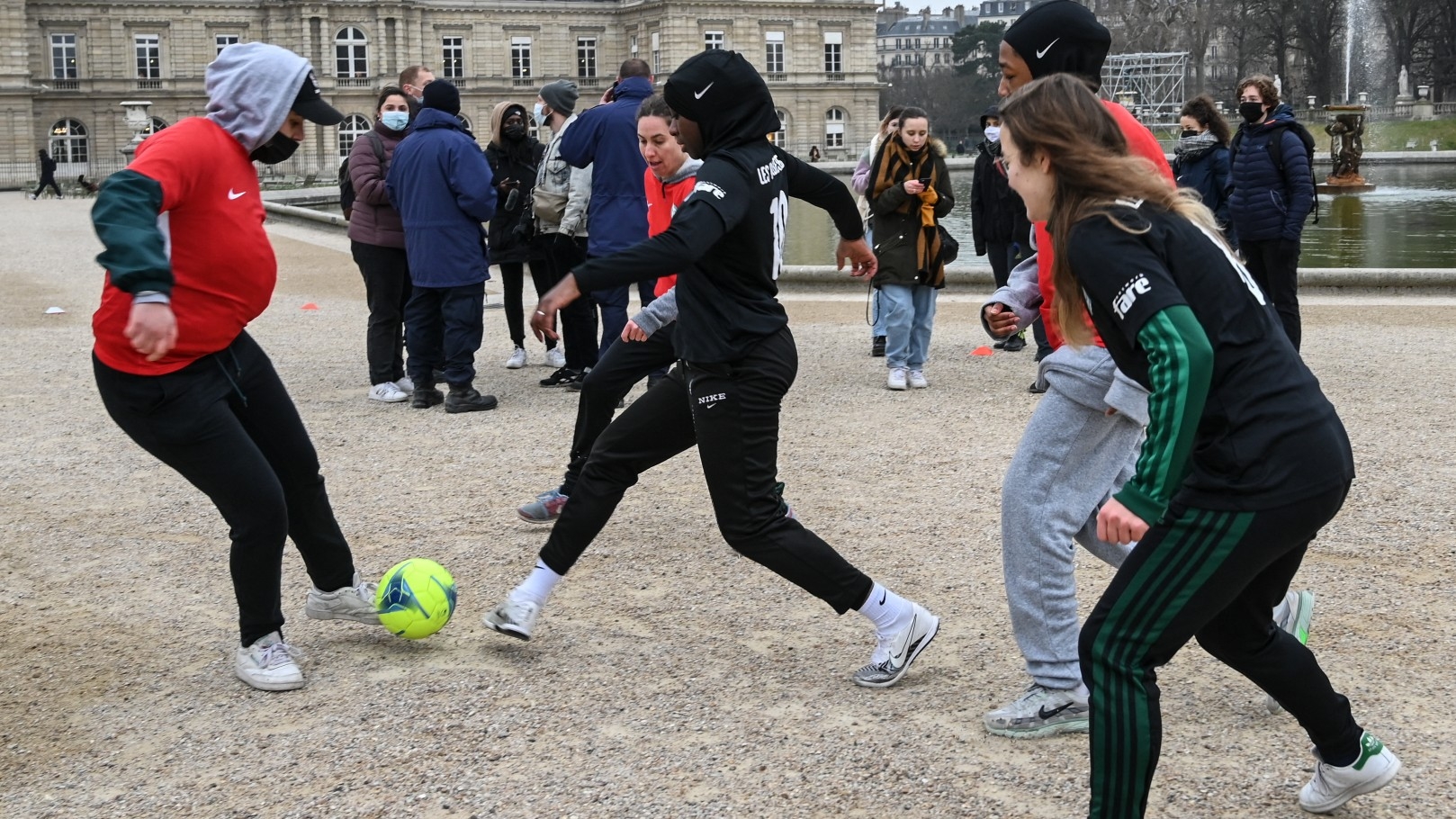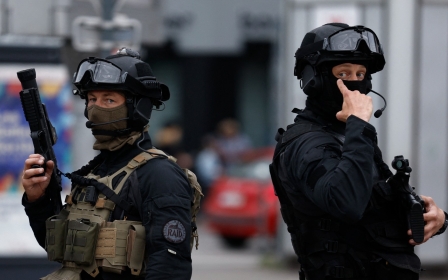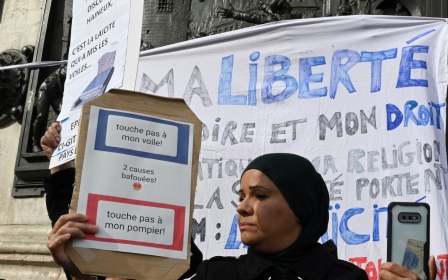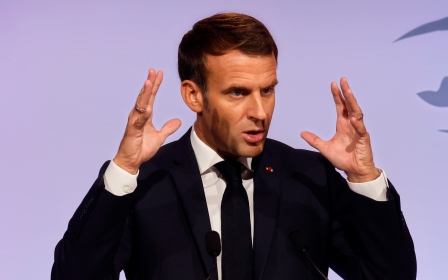Women's World Cup 2023: France's ban on hijab in women's football is an act of state racism

As Muslims around the world were enjoying the festivities of the Eid al-Adha holiday, France's top administrative court ruled last month that the French Football Federation (FFF) could continue to ban hijab-wearing players from the pitch.
The decision effectively strips hijab-wearing women from all opportunities to participate in the beautiful game - playing, coaching, officiating and participating at any level of football in France.
The issue behind all of this is rooted in laïcité, the French concept of secularism and the reason the FFF wants to keep religious symbols away from football. The FFF maintains that permitting hijabs on or near the pitch goes against a 1905 law on secularism.
New MEE newsletter: Jerusalem Dispatch
Sign up to get the latest insights and analysis on Israel-Palestine, alongside Turkey Unpacked and other MEE newsletters
The rule is, therefore, not being evenly applied. It is primarily being enforced on Brown and Black women who are Muslim and wear headscarves, though it also prohibits kippahs and turbans from the pitch, thereby excluding Jewish and Sikh male players as well.
A 'human rights' issue
In less than 10 days, players of the highest echelon of women's football will be gathering in Australia and New Zealand to compete in the Women's World Cup. The court's ruling is a slap in the face to anyone advocating for gender equity in football, let alone mere weeks before an international event aimed at providing greater opportunity and representation for women athletes.
The French court's ruling to ban hijab-wearing players from the pitch is a slap in the face to anyone advocating for gender equity in football
But so few even know and even fewer care to speak out. Those who do know remain deafeningly silent or unconcerned because, as is often the case, those in power are largely unaffected by policies disproportionally marginalising racialised women and girls.
In May 2020, Les Hijabeuses began advocating for their right to play football by staging public matches and inviting the media to capture them enjoying the sport. Their scarves flying in the wind, they hosted a tournament in December and raised money for female guides of Kilimanjaro.
They collaborated with groups that support social justice initiatives around France including Alliance Citoyenne. They play against other women and girls who are not Muslim, or who may not wear hijab. Many of their supporters rightly see this as a human rights issue.
More than anything, this group of women want to play football. They want to manifest their love of the sport by actually playing. They also want the game they love to embrace them in return. At the moment, football in France is not allowed to love them back.
Not only do French sports authorities show such clear disdain for hijab-wearing girls and women, but they also want to keep them benched.
The International Federation of Association Football (FIFA) first disallowed hijabs in 2007 but struck down their own ban on 1 March 2014. There was an effort from within those in the football ecosystem to bring hijab into the global fold. They were successful. From that, women's football began to expand and grow.
Every country in the world made accommodations - except France - which has only doubled down on its discriminatory policies and imposed a law that knowingly excludes women and girls from the right to play sports.
'Stunningly hypocritical'
In 2019, France hosted the Women's World Cup - celebrating football and the growth and achievements of women athletes while excluding several others in the country from participating.
I attended and was on a panel hosted by FARE network alongside French legal scholar Rim-Sarah Alouane, sports sociologist Haifa Tilli, and two women active in the Muslim community, Mariem Sabil and Fatiha Abjli. I attended as a member of the sports media who has covered this issue for more than 10 years.
These discussions were excluded from mainstream coverage despite the FFF's stunningly hypocritical stance. How can France purport to advocate for women's football while entirely shutting out a specific group of women? The absurdity is almost comical.
Yet four years later, the discrimination continues. Dr Tlili's Twitter thread following news of the French court's ruling was marinated in frustration and she deserves to feel this way. I also felt anger and profound sadness when reading the reports.
The toll that this work has taken on the activists fighting such oppression and exclusion in football cannot be overstated. It is high time that this issue is addressed and the discriminatory policies against Muslim women and other marginalised communities overturned.
Insisting that women should simply remove their scarves before playing is not a solution. Women choosing to cover often do so for deeply personal and spiritual reasons.
Offering a choice to sit out or uncover is not a choice: it is violence systemically implemented by the FFF
As I have said time and again, forcing women out of clothing is as violent as forcing them into it. Offering a choice to sit out or uncover is not a choice: it is violence systemically implemented by the FFF.
In 2019, the juxtaposition of speaking about this pressing and personal issue and then going to watch women's matches in massive stadiums weighed heavily on me. On the one hand, I wanted to grow the women's game and was dedicated to telling those stories. On the other, the sheer injustice against Muslim women in French football was and remains appalling to me.
When I was in university and decided to start wearing hijab, I was told by the varsity team coach and my club coach that I couldn't play anymore if I continued covering my hair. I was devastated but ultimately chose my faith. I should not have had to make that decision. I should have had the choice. Supporting women means giving them options, not ultimatums.
I would later watch Zinedine Zidane hoist the Men's World Cup trophy for France. When France won the World Cup in 2018, I thought about the irony of France using Muslim men for their successes while rejecting their sisters, mothers and daughters from the same sport.
A fight for existence
The issue of banning hijab from sports is not new. I have written about the banning of hijab in basketball, boxing, swimming and a multitude of other sports as well. There is a simple pattern: it is a way in which controlling the bodies of Muslim women continues.
Denying women the choice to dress safely and as they please is misogynistic. When FIFA allowed hijab, they approved the design of a specific hijab that would not be injurious to the player or an opponent. There is no danger to a player nor is there a danger to society. It makes one stop and ask what the French are so desperately afraid of. It doesn't seem to be faith since they permit it when it reflects "French culture".
Muslim communities exist in France as a product of brutal colonialism. The fight for hijab on the pitch is not only about the beautiful game, or access for racialised youth. It is about existence. It is about swimming in a burkini or walking and not getting murdered by the police because you are young, Black and Muslim.
France's rigidity on this issue is not about keeping sports equal; it is about denying access to those who aren't deemed "French" enough. Black and Brown, African, Arab or South Asian Muslim women and girls are not hiding and they will not shy away from their faith and right to cover.
I am working on an initiative with a young Ghanaian footballer named Maxwell Woledzi. Woledzi, who plays professionally in Portugal, founded The Hijab Project to offer girls a sports hijab if they choose to wear it. It was first adopted in a women's league by Anatu Sadat, the first player to wear a hijab in Ghana. Sadat currently attends Navarro College in the US on a soccer scholarship. It is heartening to see hijab-wearing players making history and men supporting those choices and helping women in football.
This year is Morocco's first appearance at the Women's World Cup. Morocco's final roster was announced on Tuesday morning and one of the defenders on the Atlas Lionesses team, Benzina Nouhaila, is the first hijab-wearing woman to play in the Senior Women's World Cup tournament.
However, Nouhaila, who plays in a professional league in Morocco, would not be permitted to play in France. How exactly is this beneficial for women's football?
And what will happen in 2024 when Paris hosts the Summer Olympics? Will athletes be conveniently discouraged from coming to France to compete? Will the world rejoice in the role of sports as a unifying agent while hijab-wearing women in France are denied the opportunity to showcase the triumph of their human spirit?
Imagine a player being benched for an international friendly because she's donning a sports hijab while playing. This is unacceptable in sports, but France is upholding hateful, racist laws. For the sanctity of sport? Or the peace of mind of Islamophobes?
Are covered Muslim women playing football really a risk to hundreds of years of liberty, equality and fraternity? Like my sisters in France, I will not stop advocating for or amplifying the need for inclusion in football, nor will I tolerate this type of gendered Islamophobia masquerading as successful secularism in sport.
When over one million tickets have been sold for the matches in Australia and New Zealand, the FFF reminds us that football is not for every woman - only for those they deem acceptable.
The views expressed in this article belong to the author and do not necessarily reflect the editorial policy of Middle East Eye.
This article is available in French on Middle East Eye French edition.
Middle East Eye delivers independent and unrivalled coverage and analysis of the Middle East, North Africa and beyond. To learn more about republishing this content and the associated fees, please fill out this form. More about MEE can be found here.





